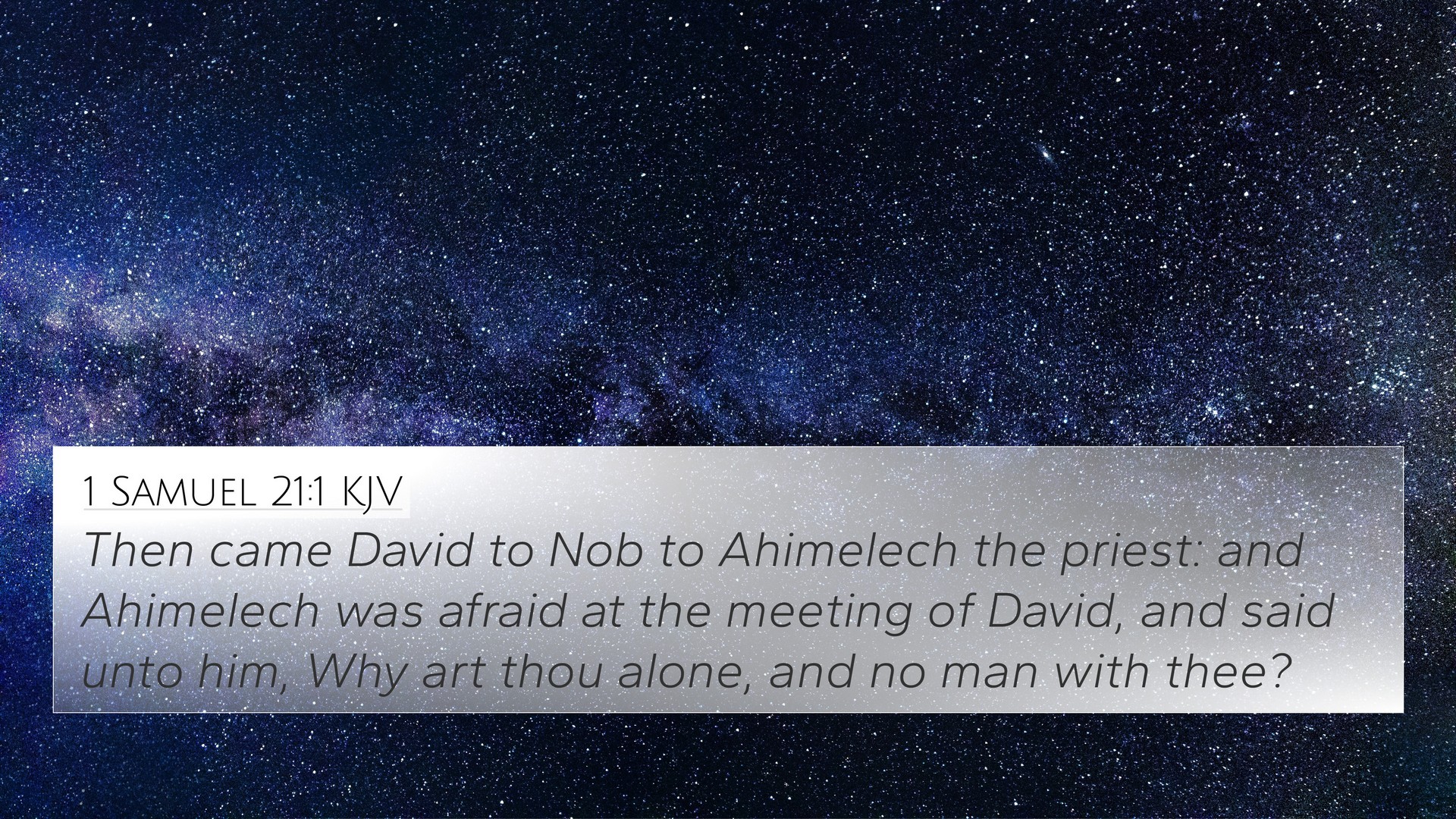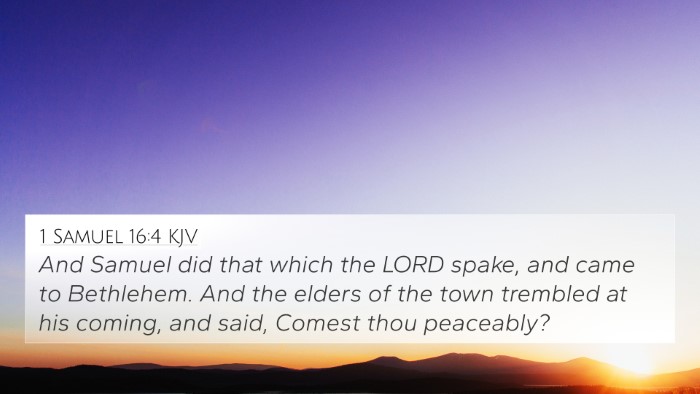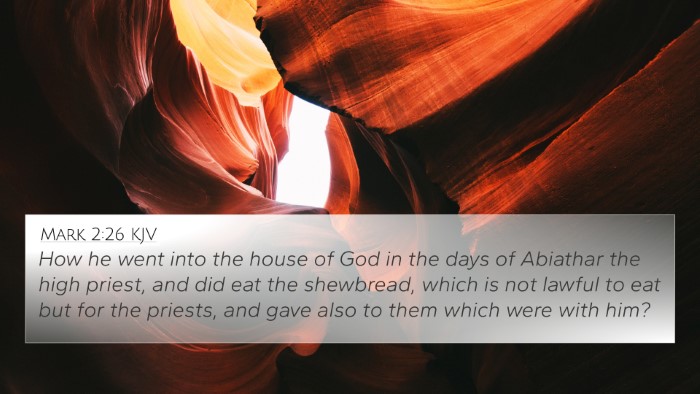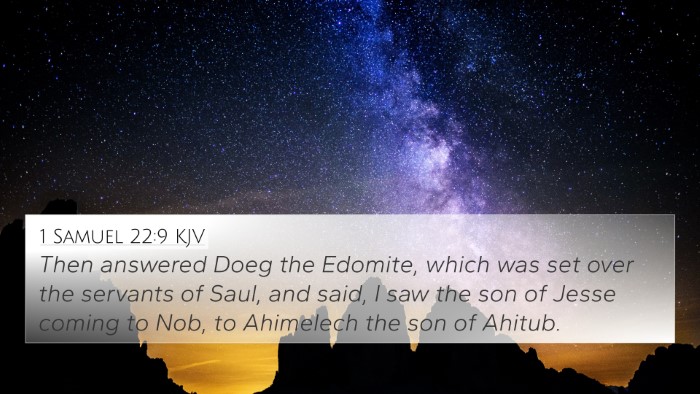Bible Verse Meaning: 1 Samuel 21:1
Verse: "Then came David to Nob to Ahimelech the priest: and Ahimelech was afraid at the meeting of David, and said unto him, Why art thou alone, and no man with thee?"
This verse marks a significant moment in David’s life as he seeks sustenance and support from the priest Ahimelech during a time of great distress. David is on the run from Saul and is not only seeking physical provisions but also spiritual support amidst the peril he faces.
Summary of Insights from Public Domain Commentaries:
-
Matthew Henry's Commentary:
Matthew Henry notes that Ahimelech, seeing David alone and in distress, was understandably fearful due to David's stature and the political situation with King Saul. The priest's fear indicates the precarious nature of David's current life and the tension surrounding him.
-
Albert Barnes' Commentary:
Barnes highlights the historical significance of Nob as a place of refuge for those in need. He points out that David’s request for bread emphasizes not just physical hunger but a deeper yearning for God’s provision in times of trouble. The question posed by Ahimelech showcases the gravity of David’s plight.
-
Adam Clarke's Commentary:
Clarke comments on the relationship between David and Ahimelech, emphasizing the trust that David places in the priest despite the danger they both face. Clarke also notes that the very presence of David alone signified trouble in the kingdom, drawing a parallel to David’s eventual kingship and the challenges he would encounter.
Key Themes and Lessons:
This verse teaches about:
- The importance of seeking help: David’s journey to Nob illustrates the idea that one should seek assistance in times of trouble, both from God and from those faithful in service.
- The role of fear in relationships: Ahimelech's fear of David highlights how external circumstances can have profound effects on interpersonal relationships and community dynamics.
- The provision of God: David’s reliance on the priest for sustenance symbolizes the need for divine help during life’s trials.
Bible Verse Cross-References:
1 Samuel 21:1 can be connected to several other scriptural references, enhancing understanding through cross-referencing Biblical texts:
- 1 Samuel 22:1-2: David’s subsequent gathering of followers illustrates the transition from isolation to community.
- Psalm 52: A reflection of David’s experience of betrayal and dependence on God amidst his trials.
- Matthew 12:3-4: Jesus references David eating the consecrated bread, pointing to the authority and necessity of divine provision.
- John 6:35: Jesus declaring Himself as the bread of life, relating to the importance of spiritual nourishment.
- Exodus 25:30: The relationship between God's provision and the showbread, linking back to the sacredness of nourishment.
- Hebrews 5:1: The priesthood and its duty showcase the significant role of priests in mediating between God and man.
- 2 Samuel 22:1-7: David’s cries for help in psalm form, reflecting his dependence on God during distress.
Connections Between Bible Verses:
Establishing connections between Bible verses like this one can deepen our comprehension of the Scripture as a whole. The relationships identified here reveal common themes such as:
- Faith under pressure: David's lone venture into Nob parallels other Biblical characters who sought refuge in God amidst trials, such as Elijah in 1 Kings 19.
- God’s provision: The act of seeking bread signifies a broader search for God’s continual sustenance, much like the Israelites seeking manna in the wilderness (Exodus 16:4).
- Impact of leadership: David’s experiences foreshadow the kind of leader he would become, seen throughout the Psalms that reflect on trials, trust, and divine salvation.
How to Use Bible Cross-References:
Utilizing tools for Bible cross-referencing allows for a richer understanding of scripture:
- Utilize a Bible concordance to locate key terms and their occurrences throughout scripture, enhancing thematic study.
- Explore Bible reference resources and commentaries for deeper insights into less understood verses.
- Engage in cross-reference Bible study methods to establish relationships between texts that deepen understanding of faith themes.
Conclusion:
In summary, 1 Samuel 21:1 is not just a historical account but a narrative filled with rich meanings about faith, fear, and the human condition in relationships with God and others. Cross-referencing this verse with others amplifies its understanding, framing it within the greater narrative of Scripture, enhancing both personal reflection and communal study.








